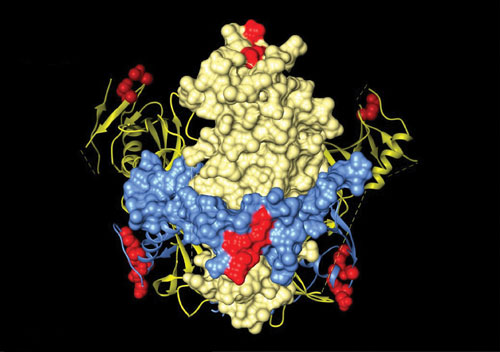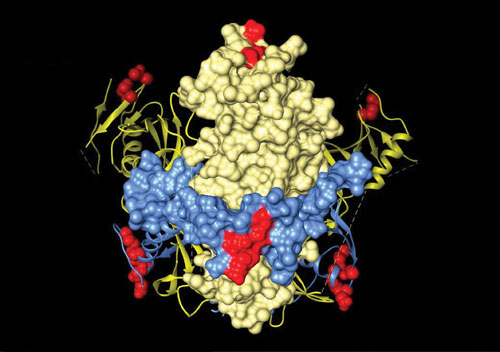January 1, 2016 (Vol. 36, No. 1)
Membrane Protein Specialist Maps Ebola’s Binding Sites to Advance Vaccine Discovery
Ebola is the latest in a series of pathogenic viruses investigated by Integral Molecular, a research-oriented biotechnology company that has a sharp eye for viral membrane proteins. Before Integral Molecular turned its watchful gaze toward Ebola, the company kept tabs on chikungunya, hepatitis C, respiratory syncytial virus, and HIV.
“Although the different viruses have different epitope targets, what we learn about one virus or cellular protein often is relevant to others,” says Integral Molecular’s president and CEO, Benjamin J. Doranz, Ph.D. “The commonality is that we work on difficult protein membrane projects.”
Essentially, the company has developed expertise in optimizing membrane proteins. Such proteins are useful in isolating, characterizing, and engineering monoclonal antibodies against otherwise intractable targets.
Integral Molecular joined the fight against Ebola at the behest of the National Institute of Allergy and Infectious Diseases (NIAID). In November 2014, the agency awarded the company $3.5 million to study Ebola and hepatitis C virus antibody response. In October 2015, the agency awarded the company another $5.5 million, this time to study Ebola antibodies to aid in vaccine discovery.
These awards could be taken as a sign of the NIAID’s abiding support for Integral Molecular’s work against persistent and emerging viral threats. In 2009, NIAID awarded the company $9.1 million for the mapping of novel B cell epitopes on the surface of dengue, chikungunya, and hepatitis C viruses. This mapping was accomplished using Integral Molecular’s Shotgun Mutagenesis Mapping technology.
Integral Molecular’s work has contributed to a pipeline of therapeutic antibodies against often intractable cellular membrane protein targets—G protein-coupled receptors (GPCRs), ion channels, and transporters. Such targets are involved in a multitude of human diseases including those characterized by neuropathic pain and autoimmunity. And, in 2014, the company isolated highly protective monoclonal antibodies (mAbs) against chikungunya virus, which threatens to take a foothold in the continental United States.

Integral Molecular’s Shotgun Mutagenesis Mapping identified the critical binding site residues for the three monoclonal antibodies that constitute ZMapp. Appearing on the crystal structure of the Ebola virus surface glycoprotein, GP, are the critical epitope residues (red). GP consists of a trimer of GP1 (yellow) and GP2 (blue) subunits linked as a heterodimer, shown here either as spacefilling or ribbon elements. One monoclonal antibody binds at the top of GP1, the remaining two monoclonal antibodies bind to overlapping sites on GP2.
Ebola Project Nets Answers
“Antibodies are at the heart of most vaccines and antibody cocktail therapies,” notes Dr. Doranz. “If you can understand how they work, you can design a vaccine or therapeutic.
“In January 2015, when we started our Ebola epitope mapping project, there were two known antibody binding sites on the Ebola surface glycoprotein. Since then, we have identified a dozen different binding sites by mapping more than 50 monoclonal antibodies and a collection of antibodies obtained from a survivor of the recent Ebola outbreak.”
Some of these antibodies are very potent and highly complementary. These antibodies, asserts Dr. Doranz, can be mixed into a broadly protective therapeutic antibody cocktail.
Antibody cocktails against Ebola were discussed in an article that was prepared by Integral Molecular. This article, which appeared August 26, 2015, in the online version of the Journal of Virology, described how the six therapeutic mAbs in the ZMapp, ZMAb, and MB-003 cocktails bind to surface glycoproteins in the Ebola virus. ZMapp is the result of a collaboration between Mapp Biopharmaceutical, Defyrus, the U.S. government, and the Public Health Agency of Canada (PHAC). It is an optimized cocktail combining the best components of MB-003 (Mapp) and ZMAb (Defyrus/PHAC).
“We have defined the epitope features for the most important therapeutic mAbs against [Ebola virus] developed to date,” wrote the authors. “Defining the epitopes and binding characteristics for these mAbs … helps explain their breadth of reactivity against different ebolavirus species, predict viral evasion against these mAbs, and design new cocktails of mAbs with improved complementarity.”
Business Model: Two Distinct Paths
Integral Molecular is focused on advancing science in-house and with partners in biopharma, biotech, and academic medical centers that are developing vaccines and therapies. “Our work is focused on the research stage, isolating antibodies against interesting targets, often with partners,” Dr. Doranz emphasizes. The company’s partners have included each of the top 10 pharmaceutical companies and more than 100 additional organizations.
Integral Molecular’s membrane protein expertise has created two distinct, yet complementary, paths for the company that provide multiple revenue streams as well as multiple avenues for growth. One path involves antibody development. “We’re very active in developing therapeutic antibodies targeting difficult membrane targets such as GPCRs, ion channels, and transporters, from isolation through proof of concept in animals,” Dr. Doranz explains.
The other business path focuses on technology development and services. Currently, Integral Molecular probably is best known for its Lipoparticles, which are virus-like particles (VLPs) that are used to isolate antibodies.
“We pioneered VLPs as biochemical agents,” informs Joseph Rucker, Ph.D., Integral Molecular’s co-founder and vice president of research and development. He co-invented Lipoparticles as a tool to study HIV co-receptor proteins. “VLPs display on their surface concentrated membrane proteins in native conformation,” continues Dr. Rucker. “So VLPs are ideal for studying these structurally complex proteins.”
Integral Molecular’s Lipoparticles are available in prevalidated and customized versions. Another Integral Molecular technology, Shotgun Mutagenesis, is a mutagenesis platform for epitope mapping and protein engineering. It is available on a fee-for-service basis, along with access to target libraries for several human membrane and viral envelope proteins.
Shotgun Mutagenesis allows researchers to map antibody binding sites on such structurally complex targets as viral envelope proteins. It works by introducing hundreds of thousands of point mutations into a target protein. Each of those mutations are tested individually in human cells to reveal which amino acid residues are required for a specific antibody to bind.
Most of Integral Molecular’s staff are research scientists. “We excel at discovery, characterization, determining mechanism of action, identifying and isolating effective antibodies for further development,” elaborates Dr. Doranz. “We apply great science to the most difficult membrane proteins to create useful products. Doing great science that leads to productive applications is what we’re about.”
Integral Molecular
Location: 3711 Market Street, Suite 900, Philadelphia, PA 19104
Phone: (215) 966-6061
Website: www.integralmolecular.com
Principal: Benjamin J. Doranz, Ph.D., President and CEO
Number of Employees: 30
Focus: Integral Molecular focuses on developing research and technologies to identify and characterize antibodies against under-exploited membrane protein targets. It has a strong focus on Ebola and other emerging viruses.



